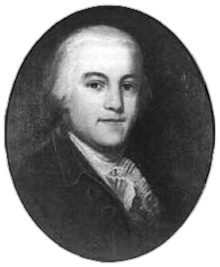Edward Rutledge (November 23, 1749 – January 23, 1800) was an American politician and one of the youngest signers of the United States Declaration of Independence. He served alongside fellow South Carolina colony delegates Thomas Heyward, Thomas Lynch Jr., and Arthur Middleton. Although he is rarely mentioned, Edward Rutledge's character played an important role in the HBO miniseries John Adams, which depicted him as one of the main antagonists of independence.

Early Years and Career
- Edward was born in the important southern colony port of Charleston, South Carolina. He was the youngest of seven children born to the well-known and wealthy Dr. John Rutledge and his mother, Sarah Hext.
- Edward received a good primary education and then moved to England, where he attended Oxford University and was admitted to the English bar. After his successful academic career, he returned to Charleston, South Carolina, to practice law.
- He would soon marry Henrietta Middleton on March 1, 1774. Henrietta was the sister of fellow signer Arthur Middleton. Edward and Henrietta had three children together, and two of them would survive until adulthood. Henrietta would die in 1792.
- Rutledge was successful in law and became an influential citizen in South Carolina despite his age. He practiced with his partner Charles Cotesworth Pickney. This influence allowed Rutledge to acquire much wealth, and he owned more than 50 slaves.
American Revolutionary War
- Edward served in the First Continental Congress alongside his brother, John Rutledge. Edward would become infamous as a signer of the Declaration of Independence and play a key role in the years prior to the American Revolutionary War. His brother John would not serve in the Second Continental Congress but would play an important role after the nation was created as a Supreme Court Justice.
- As a slaveholder, Edward opposed the idea that African-Americans should be allowed to serve in the Continental Army and was instructed not to support Lee's Resolution of Independence due to South Carolina leaders being unsure about the proposal.
- Their reluctance would soon dissipate, and by July of 1776, Edward Rutledge would cast a vote in favor of Independence. He signed the document at the young age of 26. He then returned to South Carolina and served in the South Carolina Assembly and served as a captain of artillery in the South Carolina militia.
- When the British captured the city of Charleston, South Carolina, Rutledge was among those that were captured, as was fellow signer and brother-in-law Arthur Middleton.
- He was held prisoner for approximately 1 year and released in 1781. He would quickly return to the state assembly, where he served until 1796.
Final Years
- During his tenure in the state assembly, Rutledge was an advocate for the seizing of Loyalist property. He was elected as Governor of South Carolina in 1798. During a government meeting in Columbia, he was sent home due to gout, and his health quickly deteriorated. Edward Rutledge died in 1798. Charles Goodrich, who authored the book Lives of the Signers of the Declaration of Independence, said this about Mr. Rutledge:
- In 1798, he relinquished his station at the bar and was elected the chief magistrate of South Carolina. His constitution, however, became much impaired as a consequence of severe and repeated attacks of the gout to which he was subject. He continued, however, to perform his official duties until within a short time before his death. This event is supposed to have been somewhat hastened by a necessary attendance upon the sitting of the legislature at Columbia and an unfortunate exposure to rain and cold during his return from the latter place to Charleston. On reaching home, he was confined by a severe illness, which terminated his life on the 23rd day of January 1800.
- The death of Mr. Rutledge was felt to be a severe loss, both by the people of Charleston and by the state at large. Few men were more deservedly respected; no one could be more generally beloved.
- Military and other funeral honors were paid to him on the occasion of his being carried to his long home, and the universal regret expressed at his departure showed full well how sincerely he was lamented.
- Both in his public and private character, Mr. Rutledge was adorned with many virtues. In his disposition, he was uncommonly benevolent; he entered with great feeling into the sufferings of his fellow men and felt it not only his duty but his pleasure to administer to their necessities.
- His deeds of kindness were many, were widely extended, and are still remembered with affection and gratitude.

